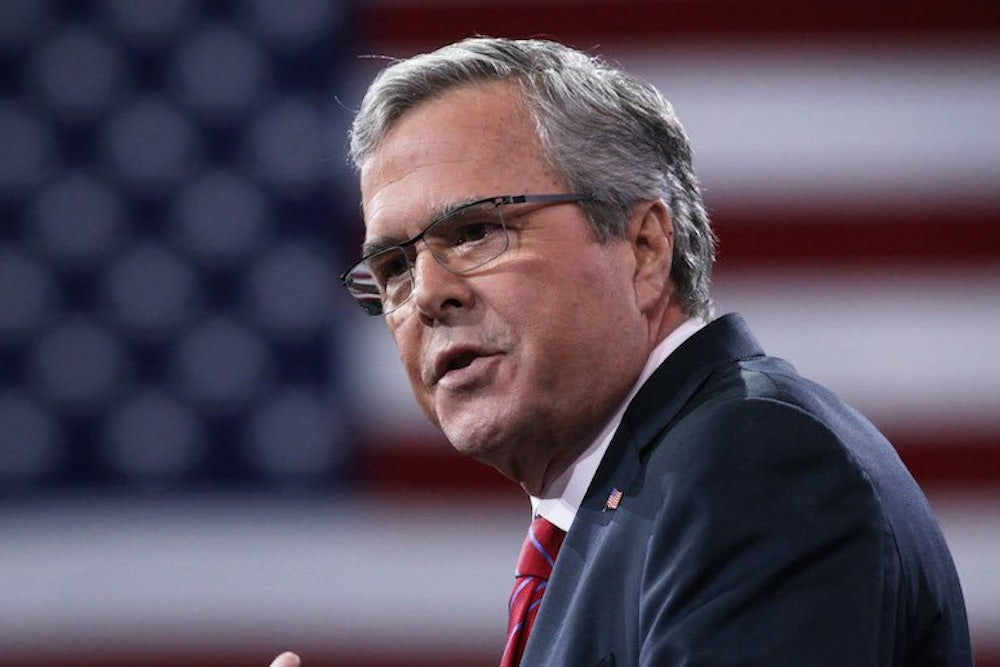Former Florida governor and likely presidential candidate Jeb Bush had a lot to say about climate change this week, putting to rest prior speculation that he might take a more reasonable position on the issue than his Republican opponents. At a campaign event in New Hampshire on Wednesday, Bush said, “I don’t think the science is clear of what percentage is man-made and what percentage is natural. It’s convoluted.” Though he said the “climate is changing,” Bush isn't convinced that mankind has contributed or that we have a mandate to do something about it. “For the people to say the science is decided on this is really arrogant, to be honest with you,” he continued. “It’s this intellectual arrogance that now you can’t have a conversation about it, even.”
On foreign policy, however, Bush needs much less certainty. The bar is so low, in fact, that he's said he would still have invaded Iraq, even knowing what we do today about the bad intelligence. “I would have,” he told Fox News earlier this month. “And so would have almost everybody that was confronted with the intelligence they got.” As with climate change, it's hard to pin down exactly how Bush views the Iraq War, and he's tied himself into knots trying to explain it, later backtracking with, “I would have not gone into Iraq.”
Under George W. Bush's administration, the White House subscribed to the hawkish war philosophy known as the One Percent Doctrine, which got its name from former Vice President Dick Cheney's post-9/11 strategy and which was codified in a book of the same name. “If there was even a 1 percent chance of terrorists getting a weapon of mass destruction—and there has been a small probability of such an occurrence for some time—the United States must now act as if it were a certainty,” the author, Pulitzer prize-winning journalist Ron Suskind wrote. Cheney insisted that “our response” was more important than “our analysis.” The administration presented its severely flawed intelligence as a certainty, in order to convince the public that Iraq had nuclear, chemical, and biological capabilities.
The Bush administration's troubling approach to foreign policy isn’t a perfect parallel to the case for climate change action, because the certainty is much higher than 1 percent—97 percent of actively publishing climate scientists say that humans are responsible for our changing climate. Still, it exposes the fallacies in Bush's argument that the U.S. should wait to act on global climate change until the science is more sure. Not only is perfect certainty a stupidly high bar to set for climate action, but it's irresponsible to insist on perfect knowledge. Climate scientists are still improving their models to forecast the precise effects of warming the planet 4 degrees Fahrenheit and higher, but they agree on this: The longer the world waits to act, the more it risks and the more catastrophic the consequences become. If we waited another few decades to do something while Republicans like Bush misrepresent reality, the damage will already be done. It will be too late.
Advocates for government action on the climate often liken it to taking out insurance for a car or home. The point of investing now is to mitigate the most severe consequences of climate change. “Confronting the possibility of climate catastrophes means taking prudent steps now to reduce the future chances of the most severe consequences of climate change,” a 2014 White House report said. “The longer that action is postponed, the greater will be the concentration of CO2 in the atmosphere and the greater is the risk.”
In another world, Cheney might have said something like: If there’s a chance that we can forestall the worst impacts of climate change, the U.S. must do what it can. It’s about our response, not just our analysis. What if he had?
Compared to going to war, acting on climate change isn't a risky bet.
